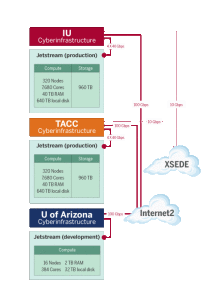 XSEDE’s new Jetstream shared cloud resource is coming online early next year, but you can now apply for Jetstream research allocations.
XSEDE’s new Jetstream shared cloud resource is coming online early next year, but you can now apply for Jetstream research allocations.
In the atmosphere, a jet stream is the border between two different masses of air. The new Jetstream cloud system will operate at the border between the existing NSF-funded cyberinfrastructure and thousands of researchers and research students who will be new to use of NSF XD program resources,” said Craig Stewart, PTI executive director and associate dean for research technologies at Indiana University. “Jetstream will give researchers access to cloud computing and data analysis resources interactively, when they need them.”
Designed for on-demand access to interactive computing and data analysis resources, Jetstream will be a user-friendly cloud computing environment for researchers and research students. Users can select from a library of virtual machines for their research; software developers and researchers will be able to create customized virtual machines or “private computing systems.” Jetstream will be attractive to those who have not been users of traditional HPC systems, including researchers in biology, atmospheric science, observational astronomy, and the social sciences.
October 15 is the deadline for January XSEDE research allocations.
Jetstream advanced computational capabilities focus on the following areas:
- Ease-of-use, broad accessibility (reducing the barriers to research on HPC environments)
- Reproducibility via storage and publication on IU Scholarworks (using digital object identifiers)
- Support for persistent gateways (including gateways for iPlant and Galaxy, and your gateway too)
- Interactive VM-based work (e.g., scientific application development and environment development)
- Jetstream is being developed by a large team of hardware and software experts, led by the Indiana University
- Pervasive Technology Institute, the Texas Advanced Computing Center, and the University of Arizona.




